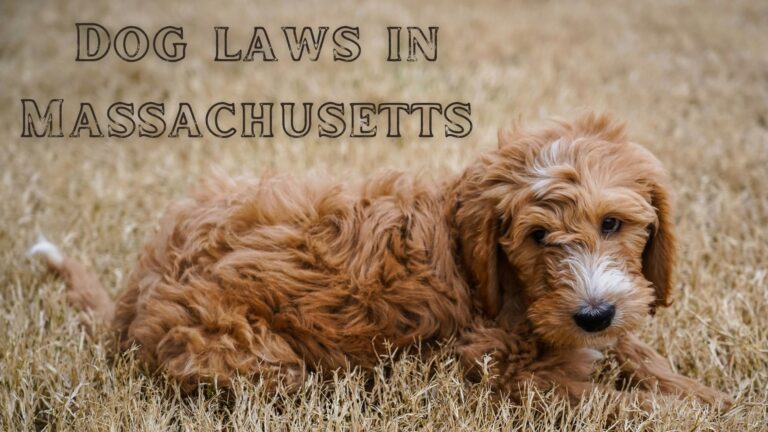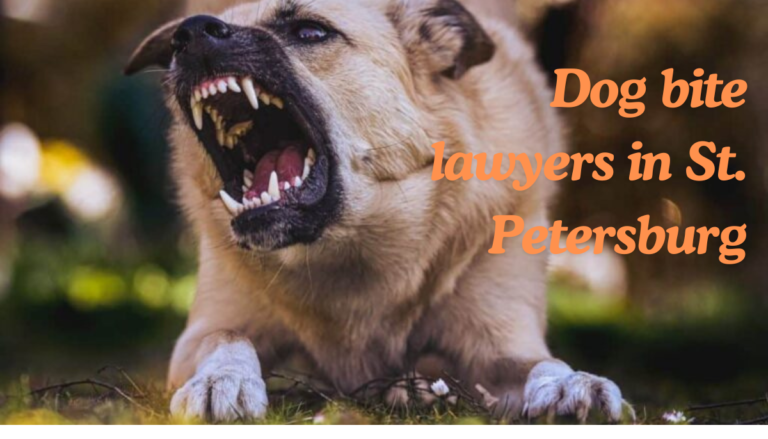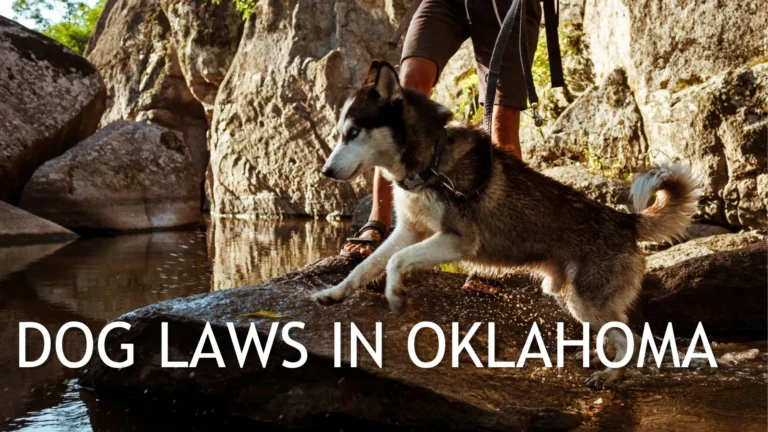Dog Laws in Indiana
Did you know that over 69 million households in the US call a furry friend a family member? With so many canine companions by our sides, it’s no surprise navigating dog laws can feel like chasing your tail.
But fear not, fellow Hoosier dog lovers! Understanding Indiana’s dog laws keeps our pups safe, happy, and out of legal scrapes. We’re talking everything from licensing and vaccination requirements to leash regulations and even responsible waste management.
By brushing up on these legalities, you ensure your four-legged friend can explore Indiana’s trails, parks, and backyards with confidence. So, let’s untangle the leash on Indiana’s dog laws and ensure your pup thrives as a responsible canine citizen!
Table of Contents
Dog Bite Laws in Indiana

Living in Indiana with a furry friend is a joy. Whether it’s exploring scenic trails, playing fetch in the park, or simply cuddling on the couch, dogs enrich our lives. However, even the most well-behaved pup can have an unexpected moment. Understanding Indiana’s dog bite laws is crucial for responsible dog ownership and navigating situations where a bite might occur.
This comprehensive guide dives into the legal landscape surrounding dog bites in Indiana. We’ll explore key aspects, answer frequently asked questions, and equip you with the knowledge to ensure your dog thrives as a valued member of the community.
Indiana’s One-Bite Rule: Understanding Liability
Unlike some states with strict liability laws, Indiana follows the “one-bite rule.” This means a dog owner is generally not liable for the first bite their dog inflicts, provided the bite occurred on their own property and the victim was lawfully present. Here’s a breakdown:
- Lawful Presence: This includes invited guests, mail carriers, or public service workers performing their duties.
- Provocation: If the victim provoked the dog, the owner might not be held liable.
However, the one-bite rule doesn’t guarantee immunity. Dog owners still have a responsibility to act reasonably to prevent bites. Here’s how negligence can come into play:
- Prior Vicious Tendencies: If a dog owner knew or should have known about their dog’s history of aggression, they might be liable for a bite, even the first one.
- Failure to Restrain: If the dog wasn’t properly leashed or confined when the bite happened, the owner could be held responsible due to negligence.
- Dangerous Breeds: While Indiana doesn’t have breed-specific bans, some municipalities might have regulations for specific breeds. It’s crucial to check local ordinances.
Beyond the One-Bite Rule: Additional Considerations
Indiana dog bite laws extend beyond the one-bite rule. Here are other key elements to consider:
- Negligence per se: Certain violations like failing to restrain a dog that trespasses and bites someone can be considered negligence per se, making the owner automatically liable.
- Criminal Charges: Depending on the severity of the bite and the dog’s history, the owner might face criminal charges.
- Trespassing: While trespassers generally have less legal protection, Indiana courts have recognized a dog owner’s duty of reasonable care even towards trespassers.
What to Do After a Dog Bite
If you or someone you know is bitten by a dog in Indiana, here are the immediate steps to take:
- Seek Medical Attention: Ensure the victim receives proper medical care to address the bite wound and prevent potential infections.
- Report the Bite: Report the incident to animal control to document the bite and initiate an investigation. This is crucial, especially if the dog is unvaccinated.
- Gather Information: If possible, obtain the dog owner’s information, including contact details and any vaccination records.
- Consider Legal Options: Depending on the severity of the bite and the circumstances, you might want to consult with an attorney specializing in dog bite cases. They can advise you on your legal rights and potential avenues for compensation.
Preventing Dog Bites: Proactive Measures
The best way to deal with dog bites is to prevent them in the first place. Here are some proactive measures responsible dog owners can take:
- Proper Training and Socialization: Enroll your dog in obedience training classes and socialize them from a young age. This helps them interact appropriately with people and other animals.
- Responsible Leashing and Confinement: Always leash your dog in public spaces and ensure they are properly confined within your property.
- Recognize Signs of Aggression: Learn to recognize potential signs of aggression in your dog, and avoid putting them in situations that might trigger them.
- Vaccinations: Keep your dog’s vaccinations current, including rabies shots. This protects your pet and others in case of a bite.
Dog Barking and Noise Laws in Indiana
Living in Indiana with a canine companion brings endless joy. However, even the most well-behaved pup can become a barker, leading to frustrated neighbors and potential legal troubles. Fortunately, Indiana offers a framework for managing noise ordinances while acknowledging the natural behavior of dogs.
Be a responsible dog owner and maintain a harmonious neighborhood. We’ll explore key regulations, answer frequently asked questions, and provide tips for preventing excessive barking.

A State Without Statewide Barking Laws
Unlike some states with specific regulations on dog barking, Indiana does not have a statewide law addressing this issue. Instead, Indiana empowers local municipalities (cities, towns, and counties) to establish their own ordinances regarding noise nuisances, including dog barking.
Here’s what this means for dog owners:
- Check Local Ordinances: The specific regulations governing dog barking will vary depending on your location.
- Focus on Reasonableness: Local ordinances typically focus on excessive and unreasonable barking that disrupts the peace and quiet of the neighborhood.
Let’s delve into some common elements found in many Indiana noise ordinances:
Common Features of Local Dog Barking Ordinances
- Duration: Many ordinances define “excessive barking” as continuous barking or howling for a specific period, often exceeding 20 or 30 minutes within a given timeframe.
- Time Restrictions: Certain ordinances might have stricter noise limitations during nighttime hours to ensure peaceful sleep for residents.
- Frequency: Repeated violations within a specific timeframe could also constitute a nuisance.
Important Considerations Beyond Local Ordinances
While local ordinances provide a framework, additional factors come into play:
- Reasonableness: Even if a barking duration hasn’t reached the defined limit, the courts might consider the context. Was the barking triggered by something specific?
- Animal Control Involvement: If your dog’s barking becomes a chronic disturbance, animal control might be notified and may issue warnings or citations.
Proactive Measures to Prevent Excessive Barking
The best approach is to address the root cause of excessive barking and prevent it from happening in the first place. Here are some proactive tips:
- Identify Triggers: Determine what triggers your dog’s barking, such as boredom, separation anxiety, fear, or territorial instincts.
- Training and Socialization: Enroll your dog in obedience training and socialize them early to build confidence and reduce reactivity.
- Provide Enrichment: Keep your dog mentally and physically stimulated with toys, puzzle feeders, and regular exercise to combat boredom-induced barking.
- Address Separation Anxiety: Work on separation anxiety issues by gradually increasing your dog’s alone time and providing comfort items when you leave.
- Consider Noise-Buffering Techniques: If your dog barks at outside stimuli, explore options like window treatments or white noise machines to create a calmer environment.
What to Do If Your Dog Receives a Barking Complaint
Here’s how to handle a barking complaint in Indiana:
- Stay Calm and Respectful: If a neighbor approaches you about your dog’s barking, be open to communication and apologize for the inconvenience.
- Investigate the Cause: Work with your neighbor to understand the specific triggers and timing of the barking.
- Implement Solutions: Develop a plan to address the barking, and explain the steps you’re taking to prevent future disturbances.
- Seek Guidance: If needed, consult a professional dog trainer for personalized strategies to manage your dog’s barking.
Dog Poop Disposal Laws in Indiana
Whether it’s exploring scenic trails, playing fetch in the park, or simply cuddling on the couch, dogs enrich our lives. However, a responsible dog owner also needs to be a responsible waste manager. Thankfully, Indiana has laws and regulations in place to ensure our communities stay clean and healthy.
This section dives into the legalities surrounding dog waste disposal in Indiana. We’ll explore key aspects, answer frequently asked questions, and equip you with eco-friendly poop scooping practices to be a model dog owner.

No Statewide Poop Scooping Law, But Local Ordinances Rule
Indiana doesn’t have a single, state-wide law mandating dog waste disposal. However, individual cities, towns, and counties have the authority to establish their own ordinances regarding pet waste management. This means:
- Local Laws Prevail: The specific regulations governing dog poop disposal will vary depending on your location.
- Focus on Responsible Ownership: Most ordinances emphasize the owner’s responsibility to pick up and dispose of their dog’s waste properly.
Here’s a breakdown of some common elements found in many Indiana dog waste disposal ordinances:
- Required Carrying of Waste Bags: Many ordinances require dog owners to carry disposable waste bags whenever walking their dogs in public spaces.
- Proper Disposal Methods: The designated disposal methods might include trash receptacles, designated pet waste stations, or responsible composting (check local regulations).
- Fines for Non-Compliance: Failure to pick up after your dog could result in fines or citations issued by animal control officers.
Beyond Local Ordinances: Importance of Responsible Waste Management
While local ordinances provide a legal framework, the bigger picture involves environmental and health benefits:
- Public Health: Dog waste can contain harmful bacteria and parasites that pose a risk to humans, especially children. Proper disposal minimizes health risks.
- Water Quality: Dog waste left on the ground can be washed away by rain, eventually reaching waterways. This can contaminate rivers, lakes, and streams, harming aquatic life.
- Community Aesthetics: No one enjoys stepping in dog poop. Responsible waste management keeps our parks, sidewalks, and neighborhoods clean and enjoyable for everyone.
Proactive Poop Scooping Practices for Eco-Conscious Dog Owners
Being a responsible dog owner means going beyond the bare minimum. Here are some tips for eco-friendly poop scooping practices:
- Biodegradable Bags: Opt for biodegradable or compostable poop bags to minimize environmental impact.
- Double Bagging: Use double bags for extra security and odor control, especially for larger dogs.
- Carry Extra Bags: Always have a few extra waste bags on hand in case you run out.
- Dispose of Bags Properly: Tie the bags securely and dispose of them in designated trash receptacles or pet waste stations. Never leave them on the ground.
- Composting (if allowed): Some localities allow responsible composting of dog waste in designated bins or personal compost piles. Check local regulations first.
Finding Specific Dog Poop Disposal Laws in Your Area
Knowing the exact regulations in your area is crucial for responsible pet ownership. Here are some resources to help you:
- Municipal Websites: Most Indiana city and county websites have sections dedicated to animal control laws and pet waste disposal ordinances.
- Animal Control Offices: Contact your local animal control office for detailed information on dog poop disposal regulations.
- Parks and Recreation Departments: If you frequent parks or trails, check the park department’s website or signage for specific waste disposal instructions.
Dog Licensing Laws in Indiana
Furry companions enrich countless households. Responsible dog ownership goes beyond training and playtime; it involves ensuring your pup is properly licensed. Dog licensing in Indiana serves multiple purposes:
- Public Safety: Licenses help animal control reunite lost dogs with their owners quickly and efficiently.
- Vaccination Tracking: Licensing often verifies that your dog is current on rabies vaccinations, safeguarding public health.
- Community Funding: Licensing fees contribute to animal control services, including sheltering strays and enforcing animal welfare regulations.
The following section unpacks Indiana’s dog licensing laws, empowering you to be a responsible dog owner and navigate the process with ease. We’ll explore key requirements, answer frequently asked questions, and provide resources for obtaining your dog’s license.

Understanding Indiana’s Dog Licensing Laws
While Indiana doesn’t have a single, state-wide dog licensing law, most cities, towns, and counties have ordinances mandating dog licensing within their jurisdictions. Here’s what this means for dog owners:
- Local Laws Prevail: The specific requirements for dog licensing, including fees and renewal processes, will vary depending on your location.
- Age Requirement: Most Indiana municipalities require dog licensing for dogs exceeding a certain age, typically four months old.
Benefits of Dog Licensing in Indiana
Obtaining a dog license goes beyond legal compliance; it offers several benefits for both your furry friend and the community:
- Identification: A license tag attached to your dog’s collar serves as a form of identification, increasing the chances of a safe return if your dog gets lost.
- Reduced Fees: Licensed dogs often enjoy discounted rates for spaying/neutering and rabies vaccinations at participating veterinary clinics.
- Peace of Mind: Knowing your dog is licensed offers peace of mind in case they wander off or animal control becomes involved.
The Dog Licensing Process in Indiana
The process for obtaining a dog license in Indiana typically involves these steps:
- Contact your local animal control office or municipality website: They will provide details on specific requirements, fees, and application forms.
- Gather Documentation: You might need proof of your dog’s rabies vaccination and spaying/neutering status (depending on local regulations).
- Submit the Application and Fee: Pay the required licensing fee, typically ranging from $10 to $50 annually (depending on location and sterilization status).
Dog Licensing in Indiana
Here are some common questions dog owners have about licensing in Indiana:
- Do I need to license my cat? Licensing requirements in Indiana typically focus on dogs.
- What happens if my dog isn’t licensed? Fines or penalties may be imposed for unlicensed dogs.
- Can I renew my dog’s license online? Some municipalities offer online renewals, while others require in-person applications. Check with your local office.
- What if I move within Indiana? Contact your new local animal control office to understand their licensing requirements and potentially transfer your existing license.
Dog Leash Laws in Indiana
Indiana is a haven for dog lovers, with countless trails, parks, and backyards offering ample space for canine adventures. However, ensuring your furry friend enjoys these spaces safely and responsibly requires understanding Indiana’s dog leash laws.
Let’s dive into the leash laws across the Hoosier State. We’ll explore key aspects, answer frequently asked questions, and equip you with responsible leashing practices to ensure your dog thrives as a valued member of the community.
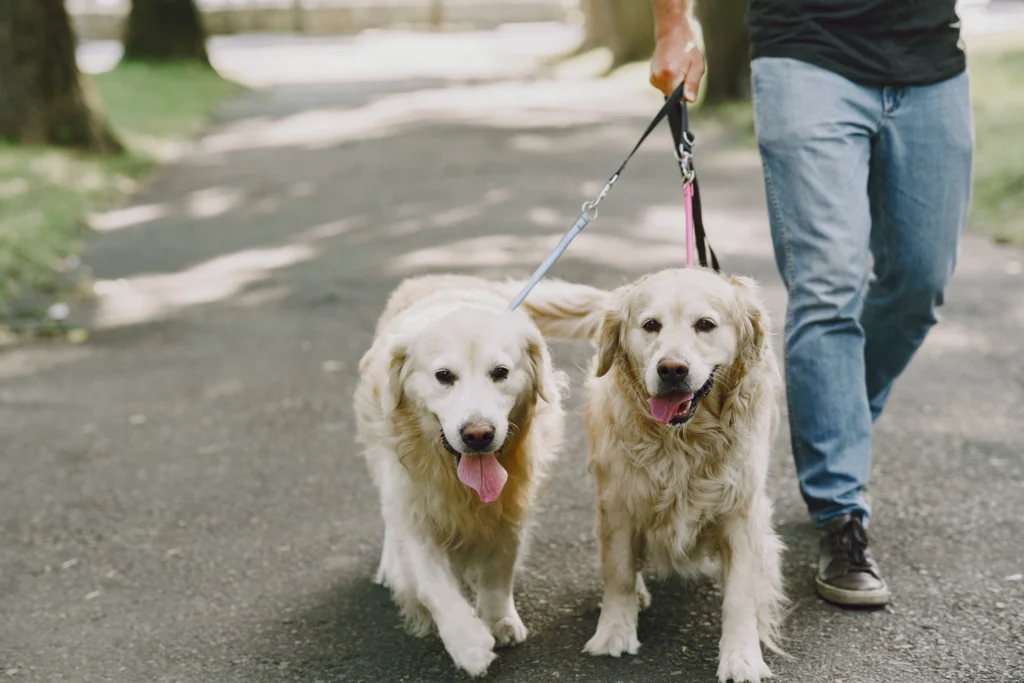
Indiana: A State with Local Leash Law Control
Unlike some states with uniform leash laws, Indiana takes a decentralized approach. Each city, town, and county has the authority to enact its own leash ordinances. This means:
- Local Laws Prevail: The specific requirements for leashing your dog will vary depending on your location. Don’t assume a statewide rule exists.
- Focus on Responsible Ownership: Most ordinances aim to promote responsible pet ownership and public safety.
Here’s a breakdown of some common elements found in many Indiana dog leash laws:
- Leash Length: Leash length restrictions might be in place, often requiring leashes under a specific length (e.g., 6 feet) when in public spaces.
- Designated Off-Leash Areas: Many communities have designated dog parks or off-leash areas where responsible owners can allow their well-trained dogs to roam freely.
- Voice and Leash Control: Even in off-leash areas, some ordinances require dog owners to maintain voice or leash control over their pets.
Beyond Local Ordinances: Importance of Responsible Leashing
While local ordinances provide a framework, responsible leashing goes beyond legal compliance:
- Safety for Your Dog: Leashes prevent your dog from running into traffic, encountering aggressive animals, or getting lost.
- Safety for Others: A leashed dog poses less risk to people who might be afraid of dogs or have small children.
- Peace of Mind: Knowing your dog is secure fosters a more enjoyable experience for you and your furry friend during walks and outings.
Responsible Leashing Practices for Hoosier Dog Owners
Being a responsible dog owner means mastering the art of leashing. Here are some tips:
- Use the Right Leash: Choose a leash appropriate for your dog’s size and breed, ensuring comfort and control.
- Practice Leash Walking: Train your dog to walk calmly on a leash, preventing pulling or lunging.
- Maintain Focus: Pay attention to your dog while walking, keeping them within a safe distance from others and distractions.
- Respect Off-Leash Areas: Only use designated off-leash areas and ensure your dog’s recall is reliable before allowing them off-leash.
- Be a Courteous Dog Owner: Clean up after your dog and be mindful of others using shared spaces.
Finding Specific Dog Leash Laws in Your Area
Knowing the exact leash laws in your area is crucial for responsible dog ownership. Here are some resources to help you:
- Municipal Websites: Most Indiana city and county websites have sections dedicated to animal control and leash law information.
- Animal Control Offices: Contact your local animal control office for detailed information on leash regulations in your area.
- Parks and Recreation Departments: If you frequent parks or trails, check the park department’s website or signage for specific leashing requirements.
Dangerous Dog Laws in Indiana
Indiana boasts a vibrant dog-loving community. However, responsible ownership extends beyond basic care and training. Understanding Indiana’s dangerous dog laws is crucial for both dog owners and the public’s safety.
This guide lays out the legal framework surrounding dangerous dogs in Indiana. We’ll explore key aspects, answer frequently asked questions, and equip you with resources for navigating situations involving potentially dangerous canines.

Indiana: No Breed-Specific Dangerous Dog Laws
Unlike some states with breed-specific bans on certain dog breeds, Indiana takes a behavior-based approach. This means:
- Focus on Actions, Not Breeds: Indiana doesn’t classify dogs as dangerous based on breed alone. The dog’s aggressive behavior determines its designation.
- Local Ordinances Might Vary: While there isn’t a statewide law, some Indiana municipalities might have additional regulations regarding dangerous dogs.
Here’s a breakdown of how Indiana typically classifies dangerous dogs:
- History of Aggression: Dogs with a documented history of biting or attacking humans or other animals, unprovoked, might be deemed dangerous.
- Severity of the Bite: The severity of the bite and the potential for future harm play a role in the designation.
- Evaluation by Animal Control: Animal control officers typically evaluate dogs suspected of being dangerous to determine the appropriate course of action.
Beyond the Legal Definition: Identifying Signs of Potential Danger
While laws provide a framework, responsible dog owners should be mindful of potential behavior indicating their dog might pose a threat:
- Aggression Towards People or Animals: Growling, snapping, biting, or lunging are all red flags.
- Excessive Barking and Territorial Behavior: Constant barking, especially coupled with aggression towards people approaching their territory, warrants attention.
- Lack of Proper Socialization and Training: Untrained or poorly socialized dogs are more likely to exhibit fear-based aggression.
Addressing Potential Dangerous Dog Behavior in Indiana
If you’re concerned about your dog’s behavior or suspect they might pose a danger, here’s what to do:
- Seek Professional Help: Enroll your dog in obedience training and consult with a qualified animal behaviorist to address the root cause of the aggression.
- Contact Animal Control: If your dog has bitten someone or exhibits potentially dangerous behavior, notifying animal control allows for evaluation and intervention.
- Preventative Measures: Implement measures like muzzling your dog in public spaces or keeping them on secure leashes to ensure safety until their behavior is addressed.
Additional Considerations
- Homeowner Association (HOA) Rules: If you live in a community with a homeowner’s association (HOA), they might have additional regulations regarding potentially dangerous dogs.
- Insurance Coverage: Consider acquiring pet insurance that covers dog bite liability, especially if you own a large breed or a dog with a history of aggression.
- Responsible Reporting: If you witness a dog attack or are concerned about a potentially dangerous dog, report it to animal control for investigation.
Dog Health and Welfare Laws in Indiana
Indiana is a dog-loving state, ensuring dog owners are held accountable. Responsible dog ownership involves ensuring your dog’s health and well-being. Thankfully, Indiana has laws and regulations in place to promote canine welfare.
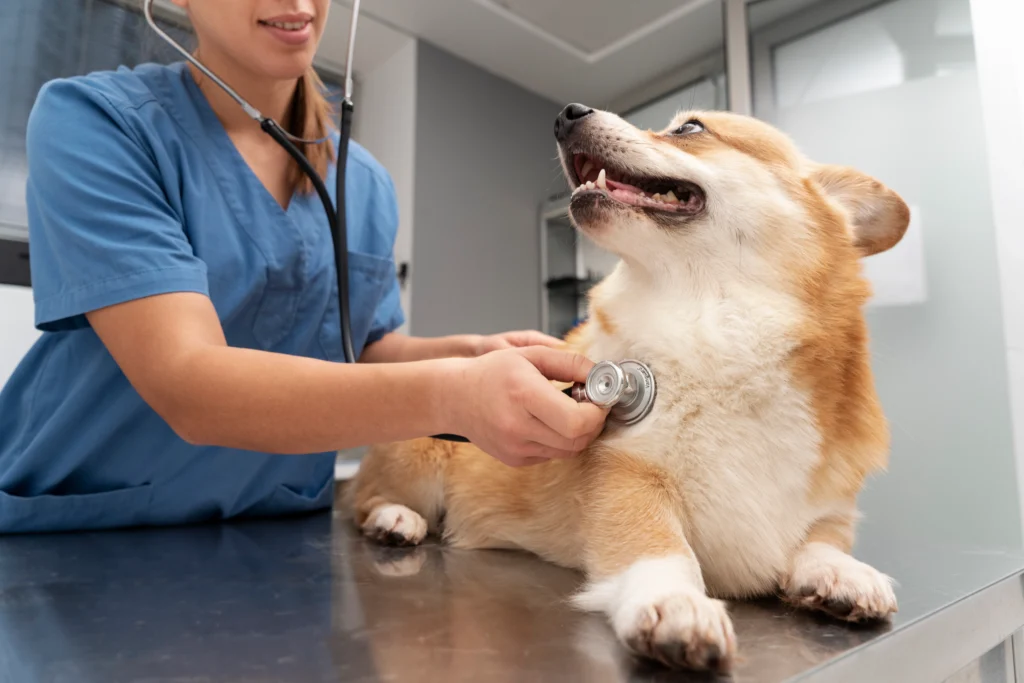
State and Local Regulations
Unlike some states with a single, comprehensive animal welfare law, Indiana utilizes a combination of:
- State Statutes: These address specific aspects of animal welfare, including rabies vaccinations and cruelty prevention.
- Local Ordinances: Many Indiana cities, towns, and counties have ordinances addressing issues like tethering, access to food and water, and proper shelter.
Here’s a breakdown of some core Indiana dog health and welfare regulations:
- Rabies Vaccinations: Indiana state law mandates rabies vaccinations for all dogs over four months old. Vaccination frequency varies depending on the vaccine type used.
- Animal Cruelty Laws: Indiana has laws prohibiting animal cruelty, neglect, and abandonment. These laws define actions like denying necessary food, water, shelter, or veterinary care as illegal.
- Tethering Restrictions: Some Indiana municipalities have ordinances restricting tethering practices, often limiting the duration and requiring access to food, water, shade, and shelter.
Essential Practices for Dog Health and Welfare
While laws provide a baseline, responsible dog ownership is about more than legal compliance:
- Proper Nutrition: Feed your dog a high-quality diet appropriate for their age, breed, and activity level.
- Preventative Veterinary Care: Regular vet checkups, parasite prevention, and timely vaccinations safeguard your dog’s health.
- Exercise and Enrichment: Provide your dog with daily exercise and mental stimulation through walks, playtime, and interactive toys.
- Safe and Secure Environment: Ensure your dog has access to clean water, proper shelter from the elements, and a safe living space free from hazards.
Additional Considerations for Dog Owners in Indiana
Here are some additional factors to keep in mind for optimal dog health and welfare in Indiana:
- Breeder Regulations: If you’re considering getting a puppy, research Indiana’s commercial dog breeder regulations to ensure ethical breeding practices.
- Microchipping: While not mandated by law, microchipping your dog significantly increases the chances of a safe return if they get lost.
- Spay/Neuter Laws: While not a statewide requirement, some Indiana municipalities offer incentives for spaying and neutering pets to curb pet overpopulation.
Resources
Knowing the exact regulations in your area is crucial for responsible pet ownership. Here are some resources to help you:
- Municipal Websites: Most Indiana city and county websites have sections dedicated to animal control and animal welfare ordinances.
- Indiana State Board of Animal Health (BOAH): The BOAH website provides information on state animal welfare laws and resources for pet owners.
- Animal Control Offices: Contact your local animal control office for detailed information on animal welfare regulations in your area.
- Indiana State Bar Association: The Indiana State Bar Association website can connect you with a lawyer specializing in animal law if you require legal assistance.
Dog Public Access Laws in Indiana
Who wouldn’t want their furry friend by their side while exploring parks, shops, or even grabbing a bite to eat? However, navigating public spaces with your dog requires understanding Indiana’s public access laws.

A Patchwork of Public Access Laws
Unlike some states with uniform public access laws, Indiana takes a decentralized approach. Public access for dogs is primarily determined by:
- Private Businesses: Businesses have the right to decide whether or not to allow dogs on their premises.
- Municipal Ordinances: Some Indiana cities, towns, and counties have ordinances outlining specific regulations for dog access in public spaces like parks and trails.
Here’s a breakdown of considerations regarding dog access in Indiana:
- “No Dogs Allowed” Signs: Respect signage clearly prohibiting dogs. Look for alternative dog-friendly establishments.
- Leash Laws: Most public spaces require dogs to be on leashes, typically with a specific length restriction.
- Designated Dog Parks: Many communities offer off-leash areas where responsible dog owners can allow their well-trained dogs to roam freely.
Responsible Dog Ownership for Public Access
Public access hinges on responsible dog ownership. Here’s how to ensure your pup is a welcome guest:
- Vaccinations Up-to-Date: Ensure your dog’s vaccinations, especially rabies, are current to comply with public health regulations and foster trust with businesses and other patrons.
- Proper Leash Etiquette: Maintain control of your dog using a leash of appropriate length and keep them away from others who might be uncomfortable with canines.
- Clean Up After Your Dog: Always carry waste bags and dispose of your dog’s waste promptly and responsibly. This is not only courteous but might be mandated by local ordinances.
- Respectful Canine Behavior: Train your dog to be well-mannered in public. Avoid excessive barking, jumping, or aggression towards other people or animals.
Dog-Friendly Establishments and Activities
While some businesses might restrict dog access, there are plenty of places where your pup can join the fun! Here are some resources to help you find dog-friendly spots:
- Online Directories: Websites like BringFido or Rover offer searchable databases of dog-friendly businesses across Indiana.
- Local Chamber of Commerce: Get recommendations for dog-friendly shops, restaurants, and activities from your local chamber of commerce.
- Social Media: Follow dog-friendly businesses and organizations on social media for updates on events and promotions.
Additional Considerations
- State Parks and Recreation Areas: Indiana state parks and recreation areas typically allow dogs on leashes, although some restrictions might be in place on specific trails or areas. Check the Indiana Department of Natural Resources website for details.
- Traveling with Your Dog: If you plan to travel with your dog within Indiana or to other states, research the specific public access laws and regulations at your destination.
- Educating Others: By being a responsible and courteous dog owner, you help bridge the gap between dog owners and non-dog owners, advocating for a more dog-inclusive Hoosier State!
Dog Travel and Transportation Laws in Indiana
Indiana is a beautiful state with scenic landscapes and charming towns, perfect for exploring with your furry friend. Whether you’re embarking on a road trip or a weekend getaway, ensuring your dog travels safely and legally is crucial.

Local Considerations
Unlike some states with specific regulations for dog travel, Indiana doesn’t have a single, comprehensive law. However, focusing on these key aspects ensures a safe and legal travel experience:
- Municipal Regulations: Some Indiana cities or counties might have ordinances regarding transporting dogs within their jurisdictions. These might pertain to public transportation or specific requirements for securing dogs in vehicles.
- Focus on Animal Welfare: Indiana’s animal cruelty laws apply to transportation as well. Ensure your dog has adequate ventilation, space, and protection from extreme temperatures during travel.
Essential Practices for Safe and Legal Dog Travel in Indiana
While there aren’t extensive state-mandated regulations, prioritize your dog’s safety and comfort with these practices:
- Secure Transportation: Utilize a crate, carrier, or harness restraint system appropriate for your dog’s size and vehicle. This prevents them from becoming projectiles in case of an accident.
- Climate Control: Maintain a comfortable temperature inside the vehicle. Never leave your dog unattended in a parked car during extreme weather conditions.
- Frequent Rest Stops: Plan regular breaks for your dog to eliminate, exercise, and hydrate, especially on long journeys.
- Vaccinations Up-to-Date: Ensure your dog’s vaccinations, including rabies, are current to comply with potential health requirements at your destination, especially if crossing state lines.
- Identification: Keep your dog’s identification tag and microchip information updated. This increases the chances of a safe return if they get lost while traveling.
Resources
Here are some resources to help you navigate dog travel regulations:
- Indiana State Board of Animal Health (BOAH): The BOAH website provides general information on animal health regulations but might not have specific details on dog travel within Indiana. (
- Municipal Websites: Check the website of your Indiana city or county for any local ordinances regarding dog transportation.
- USDA Animal and Plant Health Inspection Service (APHIS): The APHIS website offers resources on pet travel requirements across the United States, including information on health certificates and rabies vaccinations.
- State Government Websites: Research the animal control department or agriculture department website of your travel destination for specific dog import regulations.
Additional Considerations
- Service Animal Laws: Federal laws protect service animals from being denied transportation. Familiarize yourself with the specific regulations to ensure a smooth travel experience with your service dog.
- Airline and Travel Carrier Regulations: Research the specific policies
Dog Housing and Accommodation Laws in Indiana
Indiana welcomes countless dog lovers, but finding pet-friendly housing can sometimes feel like navigating a maze. Indiana’s dog housing and accommodation laws empower you to secure a comfortable and legal haven for yourself and your canine companion.

Fair Housing Act, with Local Variations
Unlike some states with specific pet deposit or breed restriction laws, Indiana relies on the Federal Fair Housing Act (FHA) as the primary framework for dog housing and accommodation. Here’s a breakdown of key aspects:
- FHA Protects Qualified Individuals: The FHA prohibits discrimination based on disability, including the need for assistance animals like service dogs or emotional support animals (ESAs). Landlords cannot deny housing or impose additional fees solely because of a qualified resident’s need for an assistance animal.
- Reasonable Accommodation: Landlords are obligated to provide reasonable accommodation for residents with disabilities, which might include allowing a service dog or ESA even if the property has a “no pets” policy.
- Verification of Assistance Animal Status: Landlords can request documentation from a qualified professional, such as a doctor or therapist, verifying the resident’s disability and need for an assistance animal.
Local Ordinances and Landlord Policies
While the FHA provides a foundation, consider these additional factors:
- Municipal Ordinances: Some Indiana cities or towns might have ordinances related to pet ownership in rental housing. These could address issues like noise restrictions or breed limitations.
- Landlord’s Discretion: Landlords generally have the right to set pet policies for their properties, as long as they comply with the FHA’s fair housing provisions. These policies could include restrictions on the number of pets, size limitations, or breed restrictions (except for service animals and ESAs with proper documentation).
Finding Dog-Friendly Housing
Here are some tips for navigating the Indiana housing market with your furry friend:
- Be Upfront About Your Dog: Inform potential landlords about your dog during the application process.
- Provide Documentation (if applicable): If you have a service dog or ESA, be prepared to provide documentation verifying your disability and the animal’s status.
- Research Dog-Friendly Communities: Websites and apps like Apartments.com or Zillow often have filters for pet-friendly rentals.
- Consider Renter’s Insurance: Securing renter’s insurance with pet coverage protects you from potential pet-related damages.
Resources for Finding Dog-Friendly Housing and Understanding Your Rights
Here are some resources to equip you for your dog-friendly housing search:
- U.S. Department of Housing and Urban Development (HUD): The HUD website provides resources and information on fair housing rights, including those related to assistance animals. (https://www.hud.gov/)
- Indiana Legal Services Corporation: This organization offers legal assistance to low-income Hoosiers, potentially including issues related to housing discrimination. (https://www.indianalegalservices.org/)
- Apartment Listing Websites: Many apartment listing websites allow filtering for pet-friendly rentals.
Dog Adoption and Sale Laws in Indiana
Whether you’re considering adoption or purchasing a pup, understanding Indiana’s dog adoption and sale laws is crucial. The legalities surrounding acquiring a dog in the Hoosier State, allow you to make informed and responsible choices.
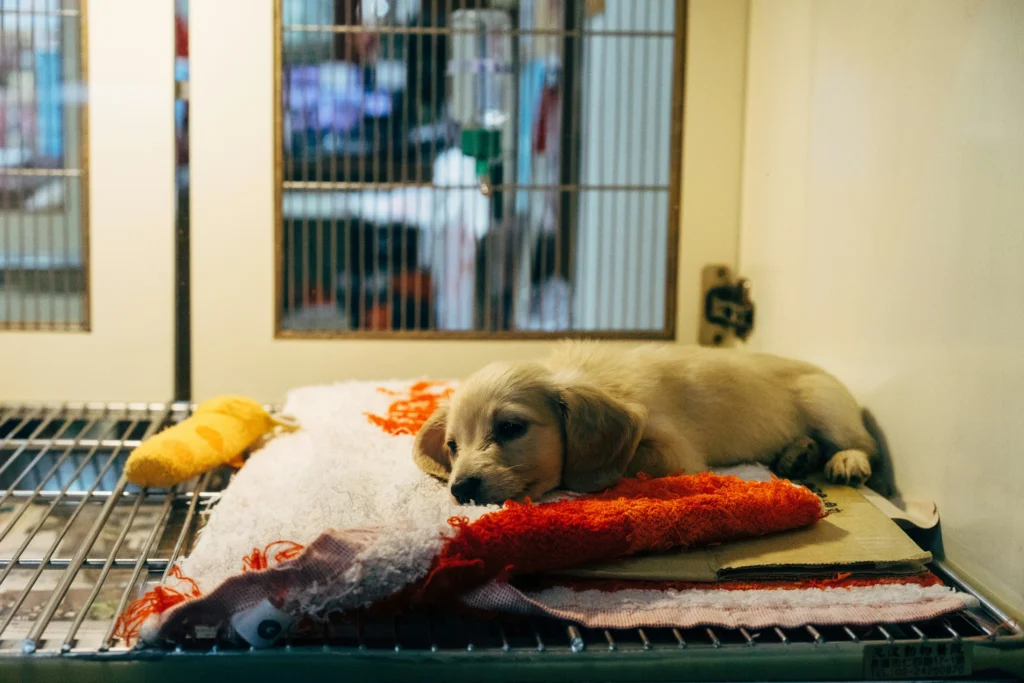
State Regulations and Local Variations
Unlike some states with a single, overarching law governing dog acquisition, Indiana utilizes a combination of:
- State Statutes: These address specific aspects like commercial dog breeder regulations and requirements for importing dogs into the state.
- Local Ordinances: Many Indiana cities and towns have ordinances related to animal shelters, pet stores selling dogs, and responsible pet ownership practices.
Dog adoption and sale laws
- Commercial Dog Breeder Regulations: Indiana requires commercial dog breeders to obtain a permit from the Indiana State Board of Animal Health (BOAH). This ensures adherence to minimum standards for animal care and welfare.
- Importing Dogs: If bringing a dog into Indiana from another state, ensure they meet any health certificate or vaccination requirements established by the BOAH.
- Responsible Pet Ownership Laws: Indiana has laws prohibiting animal cruelty, neglect, and abandonment. These apply to both breeders and individual dog owners.
Dog Adoption in Indiana
Indiana offers a plethora of options for adopting a dog:
- Animal Shelters and Rescue Organizations: Numerous shelters and rescues throughout the state house countless dogs waiting for loving homes. These organizations often screen potential adopters and provide information on the dog’s history and needs.
- Breed-Specific Rescues: If you have a particular breed preference, consider breed-specific rescue organizations dedicated to rehoming dogs of certain breeds.
Considerations for Adopting a Dog in Indiana
Here are some key factors to consider when adopting a dog in Indiana:
- Adoption Fees: Adoption fees vary depending on the organization but typically cover the dog’s vaccinations, spaying/neutering, and microchipping.
- Adoption Requirements: Shelters and rescues might have adoption requirements like a home visit or proof of prior pet ownership.
- Meeting Your New Dog: Spend time interacting with potential adoptable dogs to ensure a good fit for your lifestyle and living situation.
Purchasing a Dog from a Breeder in Indiana
If you choose to purchase a dog from a breeder, Indiana has regulations in place:
- Choosing a Reputable Breeder: Look for breeders who prioritize the health and well-being of their dogs and adhere to responsible breeding practices.
- Verifying Breeder License: Ensure the breeder has a valid commercial dog breeder permit issued by the BOAH.
- Understanding Your Contract: Read and understand the terms of any sales contract before purchasing a dog from a breeder.
Important Considerations When Buying a Dog from a Breeder
Here are some crucial points to consider when buying a dog from a breeder in Indiana:
- Breeder’s Reputation: Research the breeder’s reputation and ask for references from previous buyers.
- Health Testing: Reputable breeders perform health screenings on their breeding stock to minimize the risk of genetic disorders in puppies.
- Meeting the Parents: If possible, meet the puppy’s parents to assess their temperament and overall health.
Additional Considerations for Dog Adoption and Sale in Indiana
Here are some additional factors to keep in mind:
- Microchipping: While not mandated by law, microchipping your dog significantly increases the chances of a safe return if they get lost.
- Spay/Neuter Laws: While not a statewide requirement, some Indiana municipalities offer incentives for spaying and neutering pets to curb pet overpopulation.
- Reporting Animal Cruelty: If you suspect animal cruelty or neglect by a breeder or pet owner, report it to your local animal control agency.
Resources for Finding Dogs for Adoption or Purchase
Here are some resources to help you find your ideal canine companion:
- Indiana State Board of Animal Health (BOAH): The BOAH website provides information on commercial dog breeder regulations and a list of licensed breeders.
- Animal Shelter and Rescue Websites: Many shelters and rescues have online listings of their adoptable dogs.
- Breed-Specific Rescue Organizations: National breed rescue organizations often have listings for dogs in Indiana.
- Online Marketplaces (with Caution): While online marketplaces can connect you with breeders or individual sellers, proceed with caution and prioritize reputable sources.
Dog Park and Recreation Laws in Indiana
What better way to bond with your furry friend than exploring parks and designated off-leash areas? However, navigating dog park etiquette and understanding Indiana’s recreation laws are essential for a safe and enjoyable experience for everyone.

Dog Park and Recreation Laws
Unlike some states with uniform dog park regulations, Indiana takes a decentralized approach. Here’s a breakdown of the key factors to consider:
- Municipal Control: Dog parks and recreation areas are primarily managed by individual cities, towns, and counties. Each locality might have specific ordinances outlining:
- Leash Laws: Most public spaces require dogs to be on a leash (typically with a specific length restriction).
- Designated Off-Leash Areas: Many communities offer dog parks where responsible dog owners can allow their well-trained dogs to roam freely.
- Park Rules: Specific dog parks might have additional regulations regarding size limitations, waste disposal requirements, and prohibited behaviors.
Dog Park Etiquette
Public spaces and dog parks thrive on responsible dog ownership. Here’s how to ensure your pup is a welcomed guest:
- Vaccinations Up-to-Date: Ensure your dog’s vaccinations, especially rabies, are current to comply with public health regulations and protect other dogs.
- Proper Leash Etiquette: Always have a leash readily available for your dog, even in designated off-leash areas. Leash your dog when entering or exiting the park, and if approaching other park users who might be uncomfortable with off-leash interaction.
- Clean Up After Your Dog: Always carry waste bags and dispose of your dog’s waste promptly and responsibly. This is not only courteous but might be mandated by local ordinances.
- Respectful Canine Behavior: Train your dog to be well-mannered around other dogs and people. Avoid excessive barking, jumping, or aggression. Be prepared to leash your dog if they exhibit undesirable behavior.
- Mind Your Dog: Maintain constant supervision of your dog while in the park.
Dog Parks and Recreation Areas in Indiana
Numerous Indiana communities offer dog parks and dog-friendly recreation areas. Here are some resources to help you find the perfect spot:
- Municipal Websites: Most Indiana city and county websites have parks and recreation sections with information on dog parks and leash laws.
- Online Directories: Websites like BringFido or Rover offer searchable databases of dog parks across Indiana.
- Mobile Apps: Apps like Wag! or Sniffspot allow you to locate dog parks and recreation areas near you, sometimes with real-time user reviews.
Dog Food and Nutrition Laws in Indiana
Ensuring your furry friend receives proper nutrition is crucial for their health and well-being. However, navigating dog food regulations and understanding best practices can be confusing.

Labeling and Consumer Protection
Unlike some states with specific regulations on dog food ingredients or nutritional content, Indiana primarily relies on the federal framework. Here’s a breakdown of key aspects:
- Federal Food, Drug, and Cosmetic Act (FD&C Act): This act, overseen by the U.S. Food and Drug Administration (FDA), establishes labeling requirements for pet food products sold nationwide.
- Guaranteed Analysis:** Pet food labels must include a guaranteed analysis section outlining the minimum percentages of protein, fat, fiber, and moisture content.
- Ingredient List:** Ingredients must be listed in descending order by weight, with the first ingredient being the most prominent.
- Indiana Commercial Feed Law: This law empowers the Indiana State Chemist, housed within Purdue University, to enforce the FD&C Act and ensure accurate labeling of pet food sold within the state.
Choosing the Right Dog Food for Your Pup
While labeling regulations provide some guidance, choosing the right dog food for your canine companion involves additional factors:
- Life Stage: Puppies, adult dogs, and senior dogs have different nutritional needs. Opt for food formulated for your dog’s specific life stage.
- Breed Size: Small, medium, and large breed dogs have varying metabolic rates. Choose food designed for your dog’s size to avoid overfeeding or undernourishment.
- Activity Level: Highly active dogs require more calories than their less active counterparts. Consider your dog’s energy expenditure when selecting food.
- Veterinarian Recommendations: Consult your veterinarian for personalized guidance on choosing the best food for your dog’s unique needs and any potential health concerns.
Understanding Dog Food Labels
Knowing how to interpret dog food labels empowers you to make informed choices:
- Guaranteed Analysis: Evaluate the protein, fat, fiber, and moisture percentages to ensure they meet your dog’s needs.
- Ingredient List: Prioritize foods with whole meat sources high on the list and avoid ingredients known to cause allergies or digestive issues in some dogs.
- AAFCO Statements: Look for statements indicating the food meets the nutritional profiles established by the Association of American Feed Control Officials (AAFCO). These profiles ensure the food provides the essential nutrients for your dog’s life stage.
Considerations for Dog Nutrition in Indiana
Here are some additional points to keep in mind:
- Raw Food Diets: While some pet owners choose raw food diets for their dogs, these require careful planning and consultation with a veterinarian to ensure they meet all your dog’s nutritional needs.
- Homemade Dog Food: Similar to raw food diets, homemade options necessitate thorough research and veterinary guidance to ensure a balanced and complete diet.
- Commercial Dog Food Recalls: The FDA maintains a database of pet food recalls. Regularly check this resource to stay informed about potential safety hazards associated with specific dog food brands or products.
Resources for Finding High-Quality Dog Food in Indiana
Finding the right dog food for your furry friend can be overwhelming. Here are some resources to help:
- Pet Food Review Websites: Websites like Dog Food Advisor or Whole Dog Journal offer reviews and comparisons of various dog food brands.
- Local Pet Stores: Knowledgeable staff at pet stores can guide you towards dog food options suitable for your dog’s specific needs.
- Veterinarian Recommendations: Your veterinarian is a valuable resource for personalized recommendations on dog food brands and dietary considerations for your canine companion.
Dog Health and Veterinary Care Laws in Indiana
Indiana is a haven for dog lovers, and ensuring your furry friend receives proper veterinary care is paramount to their well-being. However, navigating the legalities surrounding animal healthcare and understanding your responsibilities can be confusing. Here, we will explore the legalities and considerations related to dog health and veterinary care in Indiana.

State Statutes and Local Regulations
While Indiana doesn’t have a single, overarching law governing veterinary care, it utilizes a combination of:
- State Statutes: These address specific aspects like rabies vaccination requirements and animal cruelty prevention.
- Local Ordinances: Many Indiana cities and towns have ordinances related to animal control, potentially including regulations on tethering, waste disposal, and licensing.
Here’s a breakdown of key Indiana dog health and veterinary care laws:
- Rabies Vaccination: Indiana law mandates rabies vaccinations for all dogs over four months old. Vaccination frequency can vary depending on the vaccine used. Consult your veterinarian for specific recommendations.
- Animal Cruelty Laws: Indiana has laws prohibiting animal cruelty, neglect, and abandonment. These laws apply to all animal owners, including dog owners. If you suspect animal cruelty, report it to your local animal control agency.
- Veterinary Licensing: The Indiana Board of Veterinary Medical Examiners licenses veterinarians in the state. This ensures they meet specific educational and experience qualifications to practice veterinary medicine.
Responsible Dog Ownership and Preventative Care
While legal requirements provide a foundation, prioritize these aspects for optimal dog health:
- Regular Veterinary Checkups: Schedule regular checkups with your veterinarian, even if your dog appears healthy. These visits allow for early detection of potential health issues and preventive care.
- Vaccinations and Parasite Prevention: Maintain a current vaccination schedule recommended by your veterinarian and utilize parasite prevention medication to protect your dog from fleas, ticks, heartworms, and other internal parasites.
- Spaying/Neutering: Spaying and neutering your dog not only helps control pet overpopulation but also offers potential health benefits for your pet.
- Microchipping: Consider microchipping your dog. This significantly increases the chances of a safe return if they get lost. While not mandated by law in Indiana, it’s a highly recommended practice.
Finding a Qualified Veterinarian in Indiana
Finding the right veterinarian for your dog is crucial. Here are some resources to help you:
- American Veterinary Medical Association (AVMA): The AVMA website allows you to search for veterinarians in your area (https://www.avma.org/)
- Online Reviews: Read online reviews of veterinary clinics in your area to get a sense of their reputation and services offered.
- Word-of-Mouth Recommendations: Ask friends, family, and other dog owners for recommendations on qualified veterinarians.
Your Rights and Responsibilities as a Pet Owner
Knowing your rights and responsibilities as a dog owner in Indiana empowers you to make informed decisions:
- Veterinary Costs: Veterinary care can be expensive. Consider pet insurance to help manage unexpected medical bills.
- Second Opinions: You have the right to seek a second opinion from another veterinarian if you disagree with a diagnosis or treatment plan.
- Client Communication: Open communication with your veterinarian is vital. Discuss all treatment options thoroughly and ask questions to understand your dog’s care plan.
Dog Identification and Microchipping Laws in Indiana
Losing a furry friend can be a terrifying experience. Fortunately, proper identification and microchipping significantly increase the chances of a safe return.
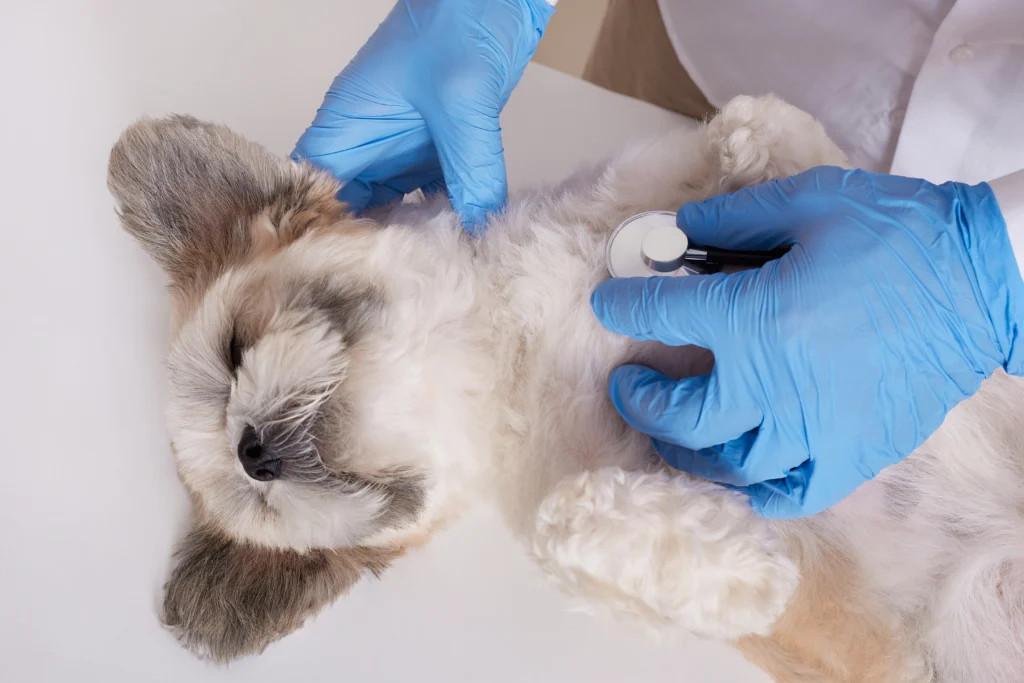
Emphasis on Identification
While Indiana doesn’t have a law mandating microchipping for all dogs, the state emphasizes permanent identification:
- Local Ordinances: Many Indiana cities and towns have ordinances requiring dog owners to license their dogs and provide some form of permanent identification. This might include a collar with an identification tag or a microchip.
- Animal Shelters and Rescue Organizations: Most shelters and rescues in Indiana require microchipping as a condition of adoption. This ensures lost dogs can be easily traced back to their owners.
Benefits of Microchipping Your Dog in Indiana
Microchipping offers numerous advantages over traditional identification methods like collars and tags:
- Permanent Identification: Microchips are implanted under a dog’s skin and remain effective throughout their life, unlike tags that can fall off or become illegible.
- Nationwide Database: Microchips are linked to national databases, allowing shelters and veterinary clinics across the country to scan a lost dog and reunite them with their owner.
- Increased Recovery Rates: Studies show microchipped dogs are significantly more likely to be reunited with their owners compared to dogs with only tags.
Important Considerations for Microchipping
Here are some key points to remember about microchipping your dog in Indiana:
- Microchip Implantation: A licensed veterinarian implants the microchip, typically between the shoulder blades, using a simple and safe injection procedure.
- Microchip Registration: Microchips themselves don’t contain owner information. It’s crucial to register the microchip with a reputable database service and keep your contact information up-to-date.
- Cost of Microchipping: The cost of microchipping can vary but is generally a small investment compared to the peace of mind it offers. Many shelters and rescue organizations offer microchipping at a discounted rate during adoption events.
Alternative Identification Methods
While microchipping is highly recommended, some Indiana localities might allow alternative identification methods:
- Collar and ID Tag: A well-fitting collar with a current identification tag containing your name, address, and phone number is a basic requirement in most areas.
- Tattooing: While less common, some dog owners choose to have their dog tattooed with identification information. However, tattoos can fade over time and might be difficult to read.
Reputable Microchipping Services
Numerous veterinary clinics and animal shelters in Indiana offer microchipping services. Here’s how to find a reputable option:
- Ask Your Veterinarian: Your veterinarian is a reliable source for microchipping services and can guide you through the registration process.
- Local Animal Shelters and Rescue Organizations: Many shelters and rescues offer microchipping at adoption events or for a minimal fee.
- Online Resources: Websites like the American Kennel Club (AKC) or the American Veterinary Medical Association (AVMA) provide information on microchipping and might have listings of microchipping services in your area.
Ensuring Your Dog’s Safe Return
Microchipping is a powerful tool, but responsible pet ownership involves additional measures:
- Keep Your Contact Information Updated: Regularly update your contact information in the microchip registry to ensure you can be reached if your dog is lost.
- Maintain a Secure Home Environment: Ensure your yard is properly fenced and supervise your dog when outdoors, especially in unfamiliar areas.
- Regular License Renewal (if applicable): If your city or town requires dog licensing, renew your dog’s license annually to maintain proper identification.
Dog Breeding and Genetics Laws in Indiana
In a thriving dog-loving community, and for those interested in becoming dog breeders, understanding the legal landscape is crucial.

Regulation and Breeder Responsibility
Unlike some states with comprehensive breeder licensing requirements, Indiana utilizes a two-pronged approach:
- State Regulations: Indiana has regulations for commercial dog breeders, focusing on animal welfare standards.
- Breeder Responsibility: The onus falls on breeders to adhere to ethical breeding practices and ensure the health and well-being of their breeding stock and puppies.
Breeding and Genetics Laws
- Commercial Dog Breeder Permit: The Indiana State Board of Animal Health (BOAH) requires a permit for anyone breeding more than 20 unaltered female dogs over 12 months old. This permit ensures adherence to minimum standards for:
- Housing and sanitation
- Veterinary care
- Recordkeeping
- Breeder education
- Animal Cruelty Laws: Indiana has laws prohibiting animal cruelty, neglect, and abandonment. These apply to all dog owners, including breeders. If you suspect animal cruelty at a breeding facility, report it to the BOAH or your local animal control agency.
Responsible Breeding Practices
While regulations provide a framework, ethical breeders prioritize animal welfare:
- Health Testing: Reputable breeders perform health screenings on their breeding stock to minimize the risk of passing on genetic disorders to puppies.
- Breed Standards: Responsible breeders adhere to breed standards established by reputable kennel clubs like the American Kennel Club (AKC) to ensure desirable physical and temperament traits.
- Puppy Socialization: Ethical breeders prioritize socialization experiences for puppies to ensure they are well-adjusted and comfortable interacting with humans and other dogs.
- Transparent Communication: Responsible breeders openly discuss their breeding practices, health testing results, and puppy care with potential buyers.
Reputable Dog Breeders
Finding a reputable dog breeder is crucial for acquiring a healthy and well-tempered puppy. Here are some resources to help you:
- National Kennel Clubs: Websites like the AKC or the United Kennel Club (UKC) offer breeder directories and information on responsible breeding practices.
- Breed-Specific Organizations: Many dog breeds have dedicated organizations with breeder referral programs.
- Online Reviews and Recommendations: Read online reviews and seek recommendations from veterinarians or other dog owners familiar with reputable breeders in Indiana.
Backyard Breeders and Puppy Mills
Indiana differentiates between responsible breeders and large-scale commercial operations:
- Backyard Breeders: These are typically small-scale operations that might not always prioritize health testing or responsible breeding practices. While not illegal, proceed with caution when considering breeders who fall into this category.
- Puppy Mills: These are large-scale breeding facilities that prioritize profit over animal welfare. Indiana regulations aim to prevent puppy mill operations by enforcing minimum standards for commercial dog breeders.
Important Considerations for Breeding Dogs
Here are some additional points to keep in mind if you’re considering breeding dogs in Indiana:
- Market Saturation: Research the demand for your chosen breed before embarking on breeding endeavors.
- Financial Investment: Responsible breeding requires significant financial investment in health testing, veterinary care, and proper facilities for breeding stock and puppies.
- Time Commitment: Breeding dogs is a significant time commitment, demanding dedication to the well-being of your breeding stock and the proper care and socialization of puppies.
Dog Environmental Impact Laws in Indiana
With great companionship comes environmental responsibility. Dog waste and pet-related activities can have an impact on local ecosystems.

Focus on Responsible Pet Ownership
Unlike some states with specific regulations on dog waste disposal or leash laws in natural areas, Indiana emphasizes responsible pet ownership through education and local ordinances.
Here’s a breakdown of Indiana’s approach:
- Municipal Ordinances: Many Indiana cities and towns have ordinances related to animal control, potentially including regulations on:
- Leash Laws: Most public parks and recreation areas require dogs to be on a leash.
- Waste Disposal: Some municipalities might have specific ordinances mandating dog waste cleanup in public spaces.
- Indiana State Parks: While Indiana state parks allow dogs on leashes, some restrictions might be in place on specific trails or areas. Check the Indiana Department of Natural Resources website (https://www.in.gov/dnr/) for details.
Minimizing Your Dog’s Environmental Impact
Responsible pet ownership goes beyond legal requirements. Here are some ways to minimize your dog’s environmental impact:
- Always Carry Waste Bags: Make waste pickup a routine part of your dog walks. Dispose of waste in designated waste bins or tie it up securely and place it in a regular trash can.
- Respect Leash Laws: Respect leash laws in public spaces to protect wildlife, vegetation, and other park users.
- Choose Eco-Friendly Pet Products: Consider biodegradable waste bags, eco-friendly pet toys made from recycled materials, and water-saving methods for dog baths.
- Minimize Travel-Related Impact: If traveling with your dog, choose pet-friendly accommodations that prioritize sustainability practices. Consider carpooling or using public transportation if possible.
Responsible Dog Ownership
Spreading awareness about responsible dog ownership benefits everyone:
- Lead by Example: Always clean up after your dog and encourage others to do the same.
- Support Local Initiatives: Support organizations promoting responsible pet ownership and environmental stewardship in your community.
- Spread Awareness on Social Media: Share information and tips about responsible dog ownership and environmental impact on social media platforms.
Resources for Responsible Dog Ownership
Numerous resources can help you become a more environmentally conscious dog owner:
- Indiana Department of Environmental Management (IDEM): The IDEM website provides information on pet waste management and its impact on the environment.
- Local Animal Shelters and Rescue Organizations: Many shelters offer resources and educational programs on responsible pet ownership.
- Environmental Organizations: Organizations like the Sierra Club or the Nature Conservancy might have local chapters promoting responsible pet ownership in natural areas.
Dog Behavioural Training Laws in Indiana
Ensuring your furry friend exhibits well-mannered behavior is crucial for a harmonious co-existence.
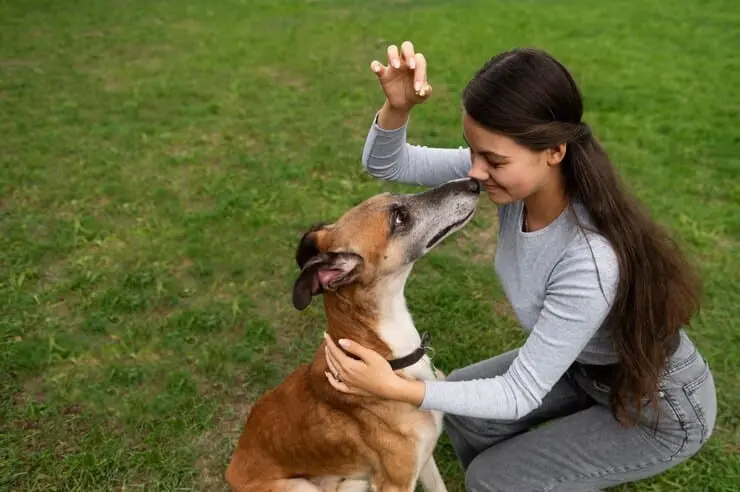
Focus on Responsible Ownership
Unlike some states with mandated training for certain dog breeds or bite incidents, Indiana doesn’t have specific laws requiring dog training. However, the state emphasizes responsible pet ownership, and well-trained dogs contribute significantly to this.
Here’s a breakdown of Indiana’s approach:
- Animal Control Ordinances: Many Indiana cities and towns have ordinances related to animal control, potentially including regulations on:
- Leash Laws: Most public spaces require dogs to be on a leash.
- Nuisance Barking: Some municipalities might have ordinances addressing excessive barking.
- Aggressive Dog Behavior: Local animal control agencies might get involved in cases of severe dog bites or aggressive behavior.
The Importance of Dog Behavioral Training
While legalities don’t dictate training, the benefits are undeniable:
- Safer Interactions: Proper training fosters better communication and control, reducing the risk of bites or injuries to humans and other animals.
- Reduced Nuisance Behavior: Training helps address barking, jumping, chewing, and other unwanted behaviors, promoting a more peaceful living environment for you and your neighbors.
- Enhanced Quality of Life: A well-trained dog is a happier dog. Training strengthens the bond between you and your pup, allowing for more enjoyable walks, playtime, and overall companionship.
Finding a Qualified Dog Trainers
Choosing the right dog trainer is essential. Here are some resources to help you:
- Professional Associations: Websites of organizations like the Association of Professional Dog Trainers (APDT) or the Certification Council for Professional Dog Trainers (CCPDT) allow you to search for qualified trainers in your area.
- Online Reviews: Read online reviews of dog trainers in your area to get a sense of their training methods and experience.
- Word-of-Mouth Recommendations: Ask friends, family, and other dog owners for recommendations on qualified dog trainers.
Important Considerations for Dog Behavioral Training
Here are some additional points to keep in mind:
- Training Consistency: Consistency is key to successful dog training. Regular training sessions and adherence to chosen techniques are crucial.
- Patience and Understanding: Dog training takes time and patience. Celebrate small victories and avoid punishment-based methods that can damage the bond with your dog.
- Addressing Underlying Issues: If your dog exhibits severe behavioral problems, consult a professional trainer or animal behaviorist to rule out any underlying medical conditions that might be contributing to the behavior.
Dog Protection and Rescue Laws in Indiana
Indiana boasts a passionate dog-loving community, and ensuring the welfare of vulnerable dogs is a priority.

Laws, Shelters, and Community Action
Indiana utilizes a combination of legal frameworks, animal shelters, and community involvement to protect and rescue dogs:
- Animal Cruelty Laws: Indiana has laws prohibiting animal cruelty, neglect, and abandonment. These laws apply to all dog owners, and violations can result in fines and even jail time.
- Indiana Board of Animal Health (BOAH): The BOAH enforces animal cruelty laws and investigates reports of abuse or neglect. You can file a report online or by contacting your local animal control agency.
- Animal Shelters and Rescue Organizations: Indiana has numerous animal shelters and rescue organizations dedicated to caring for homeless, abandoned, or abused dogs. These organizations play a vital role in finding safe and loving forever homes for rescued dogs.
Recognizing Signs of Dog Abuse and Neglect
Understanding the signs of abuse and neglect empowers you to report suspected cases:
- Physical Signs: Signs of abuse might include injuries, malnutrition, excessive matting or fur loss, and lethargy.
- Behavioral Signs: Fearful or aggressive behavior, unusual vocalizations, and excessive cowering can indicate a dog is being mistreated.
- Unsanitary Conditions: Keeping a dog in filthy or unsafe conditions with inadequate food and water access constitutes neglect.
Reporting Suspected Dog Abuse or Neglect in Indiana
If you suspect a dog is being abused or neglected, don’t hesitate to take action:
- Contact Local Animal Control: Your local animal control agency has the authority to investigate reports of animal cruelty and remove dogs from abusive situations.
- File a Report with the BOAH: You can file a report of suspected animal cruelty online on the BOAH website.
- Gather Evidence (if possible): If safe to do so, document the abuse or neglect with photos or videos to support your report.
- Seek Help from Local Animal Shelters or Rescues: Many shelters and rescues offer resources and guidance on reporting animal cruelty and can help advocate for the dog’s welfare.
Supporting Indiana’s Dog Rescue Organizations
Animal shelters and rescue organizations play a critical role in dog protection and rescue. Consider these ways to show your support:
- Adopt a Dog: Giving a homeless dog a loving forever home is the most impactful way to support rescue organizations.
- Volunteer Your Time: Shelters and rescues often need volunteers for tasks like dog walking, socializing puppies, or assisting with administrative duties.
- Donate: Financial donations or donations of essential supplies like food, toys, and bedding can significantly aid these organizations.
Getting Involved in Dog Advocacy Efforts in Indiana
There are numerous ways to get involved in advocating for dog welfare in Indiana:
- Support Legislation for Stronger Animal Protection Laws: Stay informed about proposed animal cruelty laws and advocate for legislation that strengthens protections for dogs in Indiana.
- Spread Awareness: Educate others about responsible dog ownership, the importance of spaying/neutering, and the benefits of adopting from shelters and rescues.
- Support Community Initiatives: Get involved in local spay/neuter clinics, pet food pantries, or other initiatives promoting responsible dog ownership and reducing pet homelessness.
Dog Entertainment and Work Laws in Indiana
Many dog owners dream of including their furry friends in entertainment or working endeavors. However, navigating the legalities surrounding dog work and entertainment can be confusing.

A Focus on Animal Welfare
Unlike some states with specific regulations for working dogs or animal actors, Indiana doesn’t have a single, overarching law governing dog entertainment and work. However, the state emphasizes animal welfare through:
- Animal Cruelty Laws: These laws apply to all situations, including entertainment and work settings. They prohibit causing unnecessary suffering, pain, or death to any animal, including dogs.
- Indiana Board of Animal Health (BOAH): The BOAH enforces animal cruelty laws and investigates reports of abuse or neglect. This includes ensuring proper care and humane treatment for working dogs or those involved in entertainment activities.
Important Considerations for Dog Entertainment
While Indiana doesn’t have specific entertainment regulations, prioritizing animal welfare is crucial:
- Breed Suitability: Choose breeds well-suited for the demands of the entertainment industry. High-energy breeds might excel in agility demonstrations, while calmer breeds might be better for photo shoots.
- Training and Conditioning: Ensure your dog receives proper training and conditioning to handle the specific demands of the entertainment activity.
- Comfortable Environment: Provide a comfortable and safe environment for your dog on set or during performances. This includes access to water, shade, and breaks to avoid overheating or fatigue.
- Respecting Your Dog’s Limits: Never force your dog to participate in activities that cause them stress or anxiety. They should enjoy the experience and be able to withdraw if needed.
Finding Reputable Dog Entertainment Opportunities
If you’re interested in showcasing your dog’s talents, here are some resources for reputable opportunities:
- Professional Animal Training Companies: These companies often work with dogs in entertainment productions and can provide training and guidance.
- Modeling Agencies with Animal Talent Divisions: Some agencies specialize in placing dogs for photo shoots or commercials.
- Local Animal Talent Shows or Events: These events can be a fun way to get your dog’s foot in the door and experience the entertainment world.
Laws Regarding Working Dogs
Indiana allows the use of dogs for specific work purposes, but adherence to animal welfare principles is paramount:
- Common Working Dog Jobs: Examples include guide dogs for the visually impaired, search and rescue dogs, and law enforcement K-9 units.
- Training and Certification: Many working dog professions require specialized training and certification programs to ensure competence and safety.
- Humane Treatment: All working dogs must be treated humanely and provided with proper care, including rest, food, water, and shelter.
Important Considerations for Working Dogs in Indiana
Here are some additional points to keep in mind if you’re considering having your dog work:
- Temperament Suitability: Select a dog breed with the temperament and physical capabilities suited for the specific work requirements.
- Professional Training: Invest in professional training from a reputable source to ensure your dog is well-equipped to handle the demands of the job.
- Prioritizing Well-Being: Regular veterinary checkups and proper care are crucial for maintaining your dog’s health and fitness for work.
Dog Technology and Innovation Laws in Indiana
Technological advancements are constantly changing the way we care for our canine companions. Understanding the legal landscape surrounding dog technology and innovation in Indiana, empowers you to make informed decisions about these exciting developments.
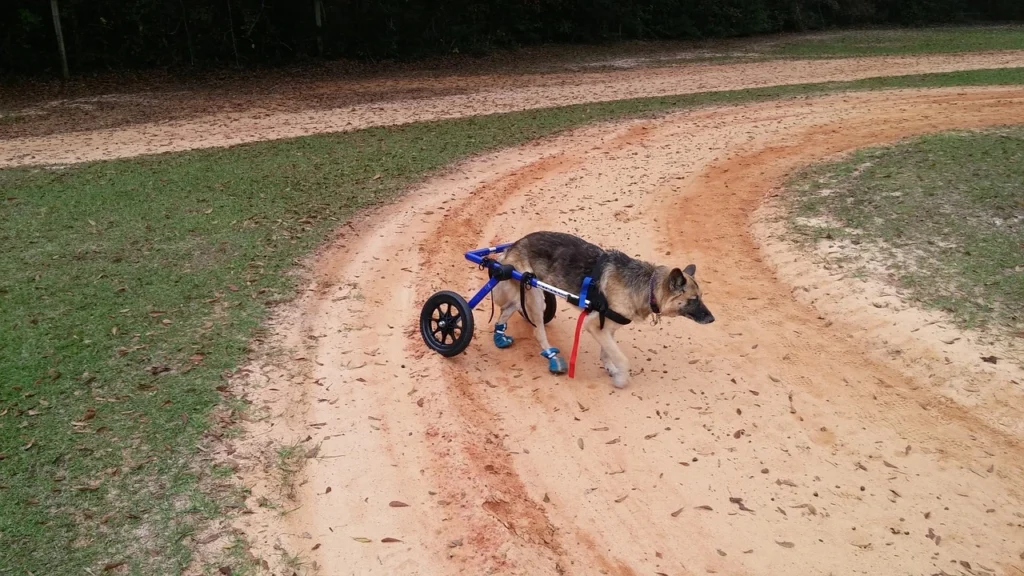
A Focus on Animal Welfare in a Tech-Driven World
Unlike some states grappling with regulations for specific pet tech products, Indiana doesn’t have a single law governing all dog technology and innovation. However, the state emphasizes animal welfare and responsible pet ownership, which applies to the use of any technology:
- Animal Cruelty Laws: These laws remain the foundation, prohibiting actions that cause unnecessary suffering or harm to animals, including through the misuse of technology.
- Indiana Board of Animal Health (BOAH): The BOAH enforces animal cruelty laws and investigates reports of neglect or abuse. This includes potential misuse of technology that could compromise a dog’s well-being.
Potential of Dog Technology
The world of dog technology offers numerous possibilities:
- Wearable Tech: Trackers monitor activity levels, location, and even vital signs, potentially aiding in early detection of health issues or preventing escapes.
- Remote Training Devices: Electronic collars with features like vibration or sound might be used for remote training, though positive reinforcement methods are generally preferred.
- Telehealth for Pets: Virtual consultations with veterinarians can offer convenience and access to specialized care, but physical examinations remain crucial for comprehensive assessments.
- Smart Pet Feeders and Toys: These devices offer portion control, automatic feeding schedules, and interactive playtime options, promoting healthy habits and mental stimulation.
Important Considerations Before Using Dog Technology
While exciting, dog tech comes with considerations:
- Prioritize Animal Welfare: Always prioritize your dog’s well-being above convenience or novelty. Ensure any technology is comfortable, safe, and used appropriately.
- Research and Choose Reputable Products: Research different technologies, their functionalities, and potential risks. Choose products from reputable companies with clear safety guidelines.
- Technology Doesn’t Replace Responsible Ownership: Tech is a tool, not a replacement for responsible ownership. Regular walks, training, vet checkups, and quality time remain essential.
The Future of Dog Technology and Innovation
The future of dog technology is promising, and Indiana might see developments in areas like:
- Artificial Intelligence (AI): AI-powered devices might analyze dog behavior for early detection of health problems or offer personalized training recommendations.
- Advanced Wearable Tech: More sophisticated wearables might monitor not just physical activity but also emotional states, providing deeper insights into a dog’s well-being.
- Telepresence for Pets: Interactive cameras or robots might allow remote interaction with your dog, offering comfort and peace of mind while you’re away.
Staying Informed and Responsible in a Tech-Driven Dog World
As dog technology evolves, responsible ownership is key:
- Consult Your Veterinarian: Discuss any pet tech options with your veterinarian to ensure suitability for your dog’s specific needs and potential health concerns.
- Stay Informed: Keep up-to-date on advancements, potential risks, and responsible use practices for various dog technologies.
- Advocate for Animal Welfare: Be a voice for responsible development and use of dog technology that prioritizes animal well-being and ethical treatment.
Human Coexistence Laws in Indiana
Fostering a strong bond with your furry friend is an enriching experience. We will explore Indiana’s legal landscape regarding human-canine cohabitation, empowering you to create a harmonious and fulfilling life with your dog.
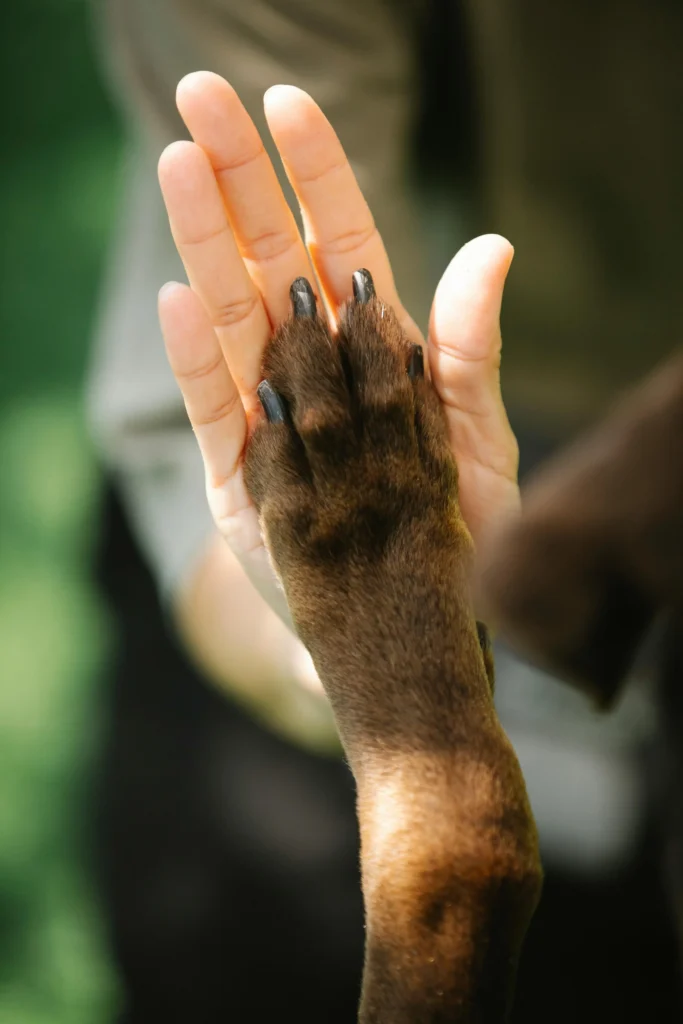
Focus on Responsible Ownership
Unlike some states with regulations on dog park etiquette or breed restrictions in certain housing types, Indiana doesn’t have specific laws dictating human-canine cohabitation. However, the state emphasizes responsible pet ownership, which indirectly promotes a positive human-dog relationship:
- Animal Control Ordinances: Many Indiana cities and towns have ordinances related to animal control, potentially including regulations on:
- Leash Laws: Most public spaces require dogs to be on a leash, promoting safety and responsible interaction with other dogs and people.
- Nuisance Barking: Some municipalities have ordinances addressing excessive barking, encouraging responsible training to minimize disturbances for neighbors.
- Licensing Requirements: Dog licensing helps track ownership and ensures dogs receive necessary vaccinations, promoting public health and responsible pet care.
Building a Strong Bond with Your Dog
While Indiana doesn’t have specific cohabitation laws, these strategies foster a positive human-dog relationship:
- Proper Training: Well-trained dogs are more enjoyable companions. Training strengthens communication, fosters trust, and reduces unwanted behaviors that can strain human-canine interactions.
- Socialization: Expose your dog to different people, animals, and environments from a young age. Socialization promotes confidence and reduces stress, leading to better interactions in various situations.
- Positive Reinforcement Training: Reward desired behaviors and avoid punishment-based methods. Positive reinforcement fosters a stronger bond based on trust and mutual respect.
- Quality Time: Dedicate time for walks, playtime, and cuddling. These interactions strengthen the human-animal bond and provide mental and physical stimulation for your dog.
Finding Dog-Friendly Activities and Resources
Indiana offers numerous opportunities for dog-human bonding:
- Dog Parks: Many communities have designated dog parks where dogs can socialize and run leash-free in a safe environment.
- Dog-Friendly Hiking Trails: Explore Indiana’s scenic trails with your furry friend, enjoying nature together while getting exercise.
- Dog-Friendly Businesses: Restaurants, cafes, and stores with dog-friendly policies allow you to include your pup in various outings.
- Dog Training Classes: Enroll in group or private dog training classes to not only improve your dog’s behavior but also strengthen your communication and teamwork skills.
Considering Renting or Owning with a Dog in Indiana
While Indiana doesn’t have specific laws regarding dogs in housing, here’s what to consider:
- Landlord Policies: Many landlords have pet policies outlining breed restrictions, size limitations, and pet deposits. Research and choose a pet-friendly rental that aligns with your dog’s needs.
- Homeownership Considerations: Owning a home allows more freedom regarding pet ownership. However, some homeowner association (HOA) rules might have pet restrictions. Research HOA policies before purchasing a property.
Fostering Responsible Dog Ownership
By following these tips, you can contribute to a more positive human-canine coexisting environment:
- Responsible Breeding: If considering breeding your dog, prioritize ethical breeding practices that promote good health and temperament in puppies.
- Spay/Neuter Your Dog: Spaying and neutering helps control pet homelessness and promotes better health for your dog.
- Community Involvement: Advocate for dog-friendly initiatives in your community, such as leash-free dog parks or educational programs on responsible dog ownership.
Other Relevant Dog Laws in Indiana
Canine Good Citizen (CGC) Programs and Legal Benefits
- CGC Programs: These programs offer training to certify dogs in good manners, basic obedience, and social skills. While not mandated by law, CGC certification might be:
- Preferred by some landlords in pet-friendly housing.
- Required for participation in specific dog-related activities or events.
- Legal Benefits: CGC certification doesn’t hold legal weight in terms of liability for dog bites or damage. However, it demonstrates your commitment to responsible ownership and can be seen favorably by authorities.
Dog Insurance and Coverage Laws
- Indiana Dog Insurance: Dog insurance is not mandatory, but it can offer financial protection in case of:
- Veterinary bills for accidents or illnesses.
- Third-party liability if your dog injures someone or damages property.
- Coverage Laws: Dog insurance policies vary. Explore different providers and coverage options to find one that aligns with your needs and budget.
Laws Regarding Dogs in Hot Cars and Animal Endangerment
- Animal Cruelty Laws: Leaving a dog unattended in a hot car can be considered animal cruelty under Indiana law. This can result in fines and even animal confiscation.
- Recommendations: Never leave your dog unattended in a hot car, even for a short period. The temperature inside a parked car can rise rapidly, posing a serious health risk to your dog.
Legal Aspects of Dog Parks and Shared Spaces
- Leash Laws: Most Indiana public spaces, including dog parks, require dogs to be on a leash. This promotes safety and minimizes potential conflicts between dogs or with other park users.
- Waste Disposal: Dog park etiquette dictates responsible waste disposal. Always carry poop bags and clean up after your dog to maintain a clean and enjoyable environment for everyone.
- Aggressive Dog Behavior: If your dog exhibits aggressive behavior at a dog park, remove them immediately. Responsible dog park use requires ensuring your dog’s safety and the safety of others.
Dog-Related Property Damage and Homeowner’s Insurance
- Homeowner’s Insurance: Most homeowner’s insurance policies cover dog-related damage to your own property to a certain extent. However, coverage for damage caused by your dog to someone else’s property might be limited or excluded.
- Understanding Your Policy: Review your homeowner’s insurance policy thoroughly to understand coverage for dog-related incidents. Consider liability coverage for added protection.
Service and Working Dog Laws in Employment and Public Access
- Indiana Law: Indiana adheres to the Americans with Disabilities Act (ADA), which protects the rights of individuals with disabilities to be accompanied by trained service animals in most public spaces and workplaces.
- Identification: Legitimate service animals are typically identified by a vest or harness. Emotional support animals are not covered by the ADA and may have limitations on public access.
Animal Welfare and Protection Laws Against Neglect and Abandonment
- Indiana Law: Indiana has animal cruelty laws prohibiting the neglect and abandonment of animals, including dogs. Neglect can include inadequate food, water, shelter, or veterinary care.
- Reporting Abuse or Neglect: If you suspect a dog is being neglected or abandoned, report it to your local animal control agency or the Indiana Board of Animal Health (BOAH).
Responsible dog ownership is key to harmonious human-canine cohabitation in Indiana. While the state emphasizes animal welfare through general laws, specific regulations vary by city or county. From attending training classes to understanding leash laws and waste disposal at dog parks, following these guidelines keeps your dog safe, happy, and ensures a positive experience for everyone. By complying with dog laws, you demonstrate responsible pet ownership and contribute to a more respectful and enjoyable environment for all dog lovers in the Hoosier State.
FAQs
Can I take my dog swimming in public lakes or waterways in Indiana?
Indiana generally allows dogs in public waterways, but leash laws might still apply. However, some specific bodies of water or beaches might have restrictions on dogs. Always check with local authorities or park management for specific regulations before letting your dog swim in a public area.
Are there any limitations on traveling with my dog in Indiana?
There are no statewide restrictions on traveling with your dog within Indiana. However, some public transportation options might have pet policies with limitations on breed size or requiring carriers. Always check with the specific travel provider beforehand.
What are the vaccination requirements for dogs in Indiana?
Indiana requires all dogs over four months old to be vaccinated against rabies. Puppies might need a series of vaccinations before reaching the required age. It’s crucial to maintain your dog’s vaccinations up-to-date for their health and to comply with the law.
What happens if my dog bites someone in Indiana?
Indiana follows the “one-bite rule” in most dog bite cases. This means the dog owner is not liable for the first offense unless they knew the dog had a propensity for biting. However, subsequent bites or reckless behavior by the owner can result in liability. It’s important to remember that even under the one-bite rule, local ordinances or homeowner’s insurance policies might come into play.
Are there any breed restrictions for dogs in Indiana?
Indiana doesn’t have a statewide ban on any specific dog breeds. However, some municipalities might have breed restrictions within their animal control ordinances. Additionally, some landlords or homeowner associations might have limitations on certain breeds in their policies. Always research local regulations and housing policies before getting a dog.



